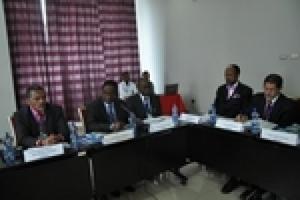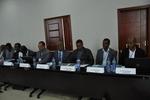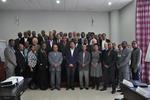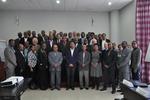Ethiopia Establishes Expert Advisory Committee for River Blindness Elimination
Addis Ababa. 7 October 2014 – The Ethiopian Onchocerciasis Elimination Expert Advisory Committee held its first session on 6 and 7 October 2014, marking its establishment. This first session of the Committee is attended by global, regional and national onchocerciasis experts from the World Health Organization, the African Programme for Onchocerciasis Control (APOC), The Carter Center, The US Center for Disease Control and Prevention, the Lions Clubs International Foundation, universities, donor groups including Merck and Co, the Federal Ministry of Health and regional health bureaus. The Director General of APOC, Dr Jean-Baptiste Roungou also attended this first session.
In his keynote address, Dr Pierre M’pele-Kilebou noted that this neglected tropical disease is “a disease of poor people with an extraordinary impact on both public health and development in affected regions,” and that WHO is working with affected countries and partners to ensure the elimination of onchocerciasis in Africa, and providing technical support to the Ethiopian Federal Ministry of Health to control and then to eliminate neglected tropical diseases in the country.
As a public health problem, onchocerciasis, also known as river blindness, is most closely associated with sub-Saharan Africa. In the past, fear of blindness forced people to move away from the fertile river valleys in the African savannah, reducing agricultural productivity and increasing poverty.
The World Health Organization, through APOC, aims to permanently protect people at risk of this debilitating and disfiguring disease in Africa through the establishment of community-directed treatment with ivermectin (CDTI), which communities are capable of monitoring and sustaining.
Control efforts have had a significant impact on both public health and development objectives in affected regions. The successes of onchocerciasis control in Africa have increased accessibility to fertile land and agricultural productivity, thereby contributing to improved economic and health status of communities at risk.
In his opening address Ethiopian State Minister, Dr Kebede Worku confirmed the Ministry’s commitment to the fight against onchocerciasis in line with its aim of empowering communities for development, adding, “The change in policy, in 2012, from onchocerciasis control to elimination will require the concerted and rigorous effort of all players, coming together – thus the establishment of this expert advisory committee.”
The establishment of the Ethiopian Onchocerciasis Elimination Expert Advisory Committee is an important step in Ethiopia’s heightened efforts to combat one of the neglected tropical diseases affecting its people. The committee will support the National Onchocerciasis Elimination Programme on technical issues related to Onchocerciasis elimination to stop ivermectin distribution in areas that meet the criteria.
For more information, please contact Dr Abate Mulugeta Beshah, Neglected Tropical Diseases, WHO Ethiopia, email: beshahb [at] who.int (beshahb[at]who[dot]int) , Tel: +251 911 401 001or Loza Mesfin Tesfaye, Communications, WHO Ethiopia, email: tesfayel [at] who.int (tesfayel[at]who[dot]int) , Tel: +251 911 144 194






